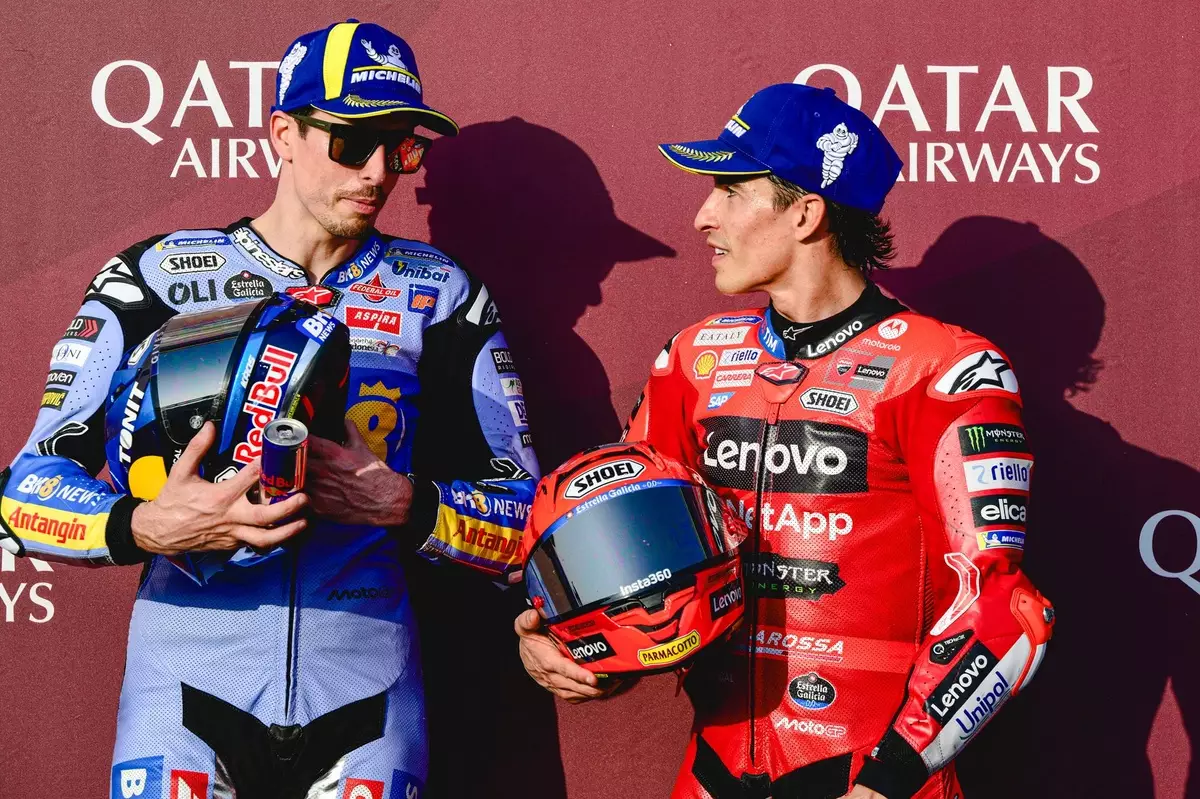In the high-octane world of MotoGP, races are not merely competitions; they are formative journeys that are colored by relationships, rivalries, and the relentless pursuit of speed. The Qatar Grand Prix showcased this dynamic vividly, particularly in the incident between Marc and Alex Marquez, two brothers who embody both the spirit of competition and the complexities of familial ties. When Marc, the elder of the two and pole position holder, claimed the apex of the first corner, the moment turned chaotic as he unexpectedly altered his speed, leading to a contact with Alex. This mishap not only damaged both Ducatis but also posed larger questions about accountability, the nature of competition, and what it means to race at such an elite level.
The Weight of Responsibility
Post-race declarations from both Marc and Alex revealed a startling sense of responsibility that is often absent in competitive sports. Marc’s assessment stating, “it was a little bit more my mistake,” exemplified a level of introspection and accountability that is commendable. His admission that his sudden deceleration took his brother by surprise sheds light not only on the physical demands of racing but also the mental gymnastics required to navigate these intricate dynamics. In an arena where split-second decisions can lead to devastating consequences, acknowledging faults is vital.
Contrast this with Alex’s own admission regarding his collision with Fabio di Giannantonio, where he reiterated, “it’s my responsibility.” This mutual recognition of fault and acceptance reflects a maturity that is often overlooked in the world of motorsport, where egos can run rampant. Such openness contributes layers to their personalities—showing that they are not just competitors, but also reflective individuals who understand the weight of their roles.
The Impact of Errors on the Championship Chase
However, responsibility does not come without consequences. Following the altercation, Alex’s performance nosedived, making him descend from a competitive position to seventh place, effectively expanding the gap between him and Marc in the championship standings. With Alex now trailing his brother by a significant 17 points, the ramifications of that single incident rippled across his season’s intentions. While Marc brushed off the incident and stayed on course to victory, Alex faced a lengthy punishment that illustrated the harsh reality of racing: one moment of indecision or error can drastically alter the course of a season and the trajectory of aspirations.
The clash also speaks volumes about the psychological pressure under which riders operate. One would assume that siblings would have a nuanced understanding, yet racing often exacerbates these situations, turning familial bonds into battlegrounds. Alex’s subsequent collision with di Giannantonio compounds his struggles, forming a spiral of errors that eventually cost him dearly.
The Broader Context of Racing Errors
Di Giannantonio’s remarks provide yet another layer of context to this narrative. His frustration was palpable as he described the collision with Alex as being overly risky, stating, “at our level, we must avoid this kind of situation.” His critique serves as a reminder that the MotoGP measure is unforgiving, especially when the stakes are high. The differentiation between various classes of racing and the expectations that come with seasoned competitors face underscored the need for impeccable judgment. The implications of a miscalculation resonate beyond individual races, impacting team dynamics, sponsorships, and the mental state of athletes.
Mistakes are integral to the sport, but at the elite level, they carry the risk of catastrophic consequences. Both Marc and Alex, through their respective mistakes, painted a vivid picture of the challenging balancing act that is needed to thrive in such a competitive landscape.
The Duality of Competition: Family vs. Fame
Racing is not just a showcase of speed; it is also a theater of human emotion and relationships. The brotherly conflict acts as a broader metaphor for the balance between familial bonds and competitive fervor. To witness two brothers clash in a pursuit of professional accolades should prompt audiences to reflect on where ambition intersects with personal ties—and the implications that follow.
In this unforgiving sport, empathy, accountability, and the recognition of one’s limitations are essential. As Marc and Alex navigate their paths—individually and collectively—fans and competitors alike delve deeper into the rich tapestry of racing that combines speed with intricate human stories that elevate the sport beyond mere competition.


Leave a Reply